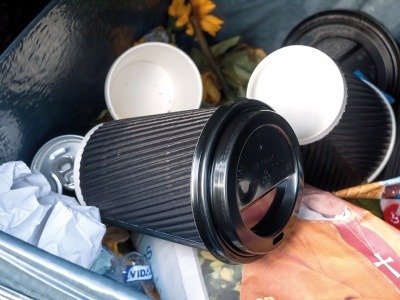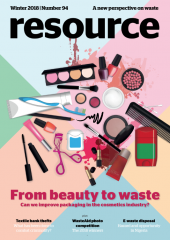How to recycle biodegradable coffee cups
Coffee cups are notoriously difficult to recycle, and many believe it is better to use alternative materials rather than focus on expensive recycling solutions. But just how environmentally friendly and how much easier to recycle are biodegradable cups?
In January, single-use coffee cups were all over the news, as MPs called for a ‘latte levy’ – a 25 pence charge for the use of a disposable cup – after it emerged that just 0.25 per cent of the 2.5 billion cups disposed of annually in the UK are recycled. While biodegradable cups are cited as a more sustainable single-use alternative, are they truly a better option?
The majority of coffee cups currently in circulation are made with a cardboard outer layer and a plastic lining. The materials are difficult to separate, and can contaminate the paper and cardboard waste stream with both the plastic element and any liquid still remaining in the cup.
 Some companies are beginning to recycle standard cups – paper manufacturer James Cropper, for instance, has launched a ‘cupcycling’ scheme, producing paper that contains 50 per cent reclaimed cup fibres using the offcuts from cupproduction.
Some companies are beginning to recycle standard cups – paper manufacturer James Cropper, for instance, has launched a ‘cupcycling’ scheme, producing paper that contains 50 per cent reclaimed cup fibres using the offcuts from cupproduction.
Packaging company DS Smith has also announced that it has a solution that could potentially recycle 2.5 billion standard coffee cups a year. It separates the paper fibre from the plastic lining of the cups by adding warm water and pressure, leaving the lining fully intact for extraction.
However, the collection of cups for recycling remains a big issue, with very few public recycling points available. Lee Marshall, Chief Executive Officer at the Local Authority Recycling Advisory Committee (LARAC), said: “The issue you have with coffee cups at the moment is that over 90 per cent do not end up in the home so it is the on-the-go, office and transport hub collection infrastructure that needs to be expanded.”
In order to have a significant impact on the amount of waste currently being sent to incineration or landfill, however, the solutions offered by both James Cropper and DS Smith would require infrastructure expansion on a monumental scale.
Moves have been made by retailers to dissuade the use of disposable cups in the first place – despite the refusal of government to introduce a mandatory ‘latte levy’ – with some companies introducing their own charges and changes to prevent cups ending up in landfill.
Costa Coffee offers customers 25 pence off any hot or cold drink if consumers bring their own reusable cup. The chain also aims to ensure one cup is recycled for every takeaway cup sold, stating on its website that ‘by 2020, we hope to recycle up to 500 million takeaway coffee cups a year.’
Working with national waste collectors, Costa will also be paying them a supplement of £70 for every tonne of cups collected, hoping to thus turn coffee cups into a desirable waste product.
Starbucks, too, has a 25 pence discount for customers who bring their own reusable cups to the stores and after a successful trial has rolled out a five pence charge for those using disposable cups. Yet, research by Starbucks shows that only 1.8 per cent of all its hot drinks are now sold in reusable mugs, proving that the discount alone is not enough of an incentive for shoppers.
Going biodegradable
In the face of a lack of recycling facilities for paper cups and the low uptake of reusables from consumers, biodegradable cups have been put forward as a solution to the problem, due to the network of existing composting facilities and reduced significance of liquid contamination. However, these cups can create even more problems if they are not disposed of properly.

However, in order to ensure that they reach one of the UK’s 50 industrial composting facilities (not all of which currently accept and deal with such products), cups must be disposed of in a segregated food waste collection. This is one of the biggest obstacles surrounding the use of compostable coffee cups – ensuring they reach a plant where they can be properly processed.
There are also potential issues caused by some of the plastic alternatives used to ensure the coffee cups are waterproof. Go-Pak makes Edenware coffee cups made of paperboard lined with plant- based polylactic acid (PLA), the most common alternative to the widely-used plastic polyethylene (PE). Mike Bristow, Sales Director at Go-Pak, states that PLA lining “is only compostable in commercial facilities where temperature, humidity and other variables are controlled to facilitate effective biodegradation.”
Other plants that recycle ordinary coffee cups will not accept these linings. Resource approached the carton reprocessor ACE UK, which runs one of the three specialist recycling facilities in the UK, for comment. Mandy Kelly, Senior Recycling Manager, said: “ACE UK do not want to receive PLA as part of the infeed stock (food and drink cartons and PE-lined paper cups) for the plant as it contaminates our separated polyal (polyethylene and aluminium) output stream.”
Clayson Smith, Senior Manager at DS Smith, expressed a similar sentiment: “PLA linings behave in a similar manner to the plastic lining in our process but may break up more than PE linings, so as such are an unwanted contaminant.”
Studies have also found that if sent to landfill, PLA will decompose anaerobically and produce methane; so compostable cups have the potential to create more environmental issues than disposable containers if they enter the residual waste stream.
Searching for solutions
Vegware – a manufacturer of over 300 certified compostable food packaging products – is working to overcome this hurdle and ensure that its products reach the correct facilities. The company works closely with its clients and the waste sector to ensure that they have appropriate waste collectors in place.
Its coffee cups use CPLA (crystallised PLA) and have been designed to be recycled with food waste via industrial composting.
Eilidh Brunton, Group Recycling Consultant at Vegware, commented that its cups are currently mostly used “in closed environments such as events, hospitals, schools and universities, where the waste can be captured and taken to the right facility for composting.”
In these environments the company then works to enhance understanding among consumers about where to dispose of products, setting up stands in canteens, as well as creating clear, bespoke bin signs.
 This article was taken from Issue 94
This article was taken from Issue 94Some of the company’s clients also use a recycling loyalty scheme whereby customers get a stamp for returning cups, as a way of helping to ensure that waste is deposited in the correct bin.
Due to the lack of collection systems taking waste to appropriate facilities, in 2017 the company launched its own waste collection service – Close the Loop – across Scotland, where it has its headquarters. The service has recently been launched in the South West of England, offering composting collections in Bristol, Worcester and Gloucester, and there are plans to expand further.
As Lucy Frankel, Communications Director, explained: “Participating cafés display the Composting Collective window sticker inviting people to bring in used Vegware for their composting bin, even if it came from a different café. Collectively, cafés can then capture compostable disposables for composting. The scheme also aims to encourage people to visit independent cafés over large high-street chains.”
While the cups cannot be composted in the average home composting bin, Vegware has collaborated with HOTBIN – a home compost bin that heats waste to 60oC – on trials showing the bin can successfully compost Vegware’s products within 12 weeks.
Biodegradable cups, when composted properly, are more environmentally friendly than standard coffee cups – and companies such as Vegware are working with the waste industry to improve ease of access to composting facilities. However, a concerted effort is needed to keep these items out of residual waste and dry recycling – or they could simply create another complex waste stream.




